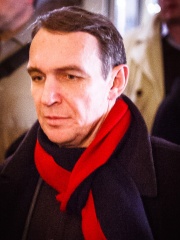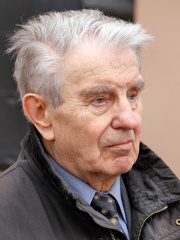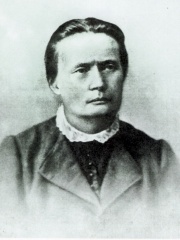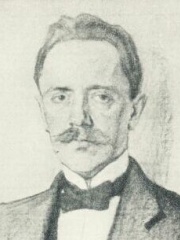
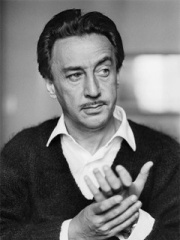
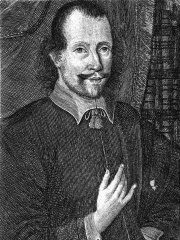
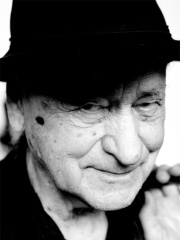
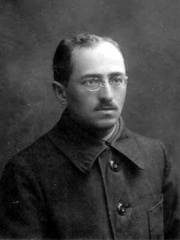
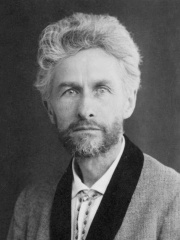
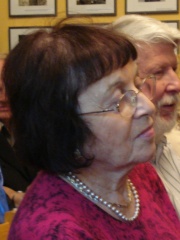
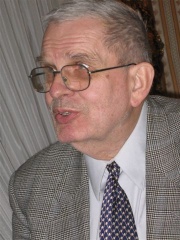
The Most Famous
WRITERS from Lithuania
This page contains a list of the greatest Lithuanian Writers. The pantheon dataset contains 7,302 Writers, 24 of which were born in Lithuania. This makes Lithuania the birth place of the 50th most number of Writers behind South Africa, and Slovakia.
Top 10
The following people are considered by Pantheon to be the top 10 most legendary Lithuanian Writers of all time. This list of famous Lithuanian Writers is sorted by HPI (Historical Popularity Index), a metric that aggregates information on a biography's online popularity. Visit the rankings page to view the entire list of Lithuanian Writers.

1. Czesław Miłosz (1911 - 2004)
With an HPI of 75.74, Czesław Miłosz is the most famous Lithuanian Writer. His biography has been translated into 100 different languages on wikipedia.
Czesław Miłosz ( MEE-losh, US also -lawsh, -wosh, -wawsh, Polish: [ˈt͡ʂɛswaf ˈmiwɔʂ] ; 30 June 1911 – 14 August 2004) was a Polish-American poet, prose writer, translator, and diplomat. He primarily wrote his poetry in Polish. Regarded as one of the great poets of the 20th century, he won the 1980 Nobel Prize in Literature. In its citation, the Swedish Academy called Miłosz a writer who "voices man's exposed condition in a world of severe conflicts". Miłosz survived the German occupation of Warsaw during World War II and became a cultural attaché for the Polish government during the postwar period. When communist authorities threatened his safety, he defected to France and ultimately chose exile in the United States, where he became a professor at the University of California, Berkeley. His poetry—particularly about his wartime experience—and his appraisal of Stalinism in a prose book, The Captive Mind, brought him renown as a leading émigré artist and intellectual. Throughout his life and work, Miłosz tackled questions of morality, politics, history, and faith. As a translator, he introduced Western works to a Polish audience, and as a scholar and editor, he championed a greater awareness of Slavic literature in the West. Faith played a role in his work as he explored his Catholicism and personal experience. He wrote in Polish and English. Miłosz died in Kraków, Poland, in 2004. He is interred in Skałka, a church known in Poland as a place of honor for distinguished Poles.

2. Romain Gary (1914 - 1980)
With an HPI of 72.97, Romain Gary is the 2nd most famous Lithuanian Writer. His biography has been translated into 50 different languages.
Romain Gary (pronounced [ʁɔ.mɛ̃ ga.ʁi]; 21 May [O.S. 8 May] 1914 – 2 December 1980), born Roman Kacew (pronounced [katsɛf]) and also known by the pen name Émile Ajar, was a French novelist, diplomat, film director, and World War II aviator. He is the only author to have won the Prix Goncourt twice (once under a pseudonym). He is considered a major writer of French literature of the second half of the 20th century. He was married to Lesley Blanch, then Jean Seberg.

3. Simon Dach (1605 - 1659)
With an HPI of 63.77, Simon Dach is the 3rd most famous Lithuanian Writer. His biography has been translated into 26 different languages.
Simon Dach (29 July 1605 – 15 April 1659) was a German lyrical poet and hymnwriter, born in Memel, Duchy of Prussia (now Klaipėda in Lithuania).

4. Jonas Mekas (1922 - 2019)
With an HPI of 63.50, Jonas Mekas is the 4th most famous Lithuanian Writer. His biography has been translated into 30 different languages.
Jonas Mekas (; Lithuanian: [ˈjonɐs ˈmækɐs]; December 24, 1922 – January 23, 2019) was a Lithuanian-American filmmaker, poet, and artist who has been called "the godfather of American avant-garde cinema". Mekas's work has been exhibited in museums and at festivals worldwide. Mekas was active in New York City, where he co-founded Anthology Film Archives, The Film-Makers' Cooperative, and the journal Film Culture. He was also the first film critic for The Village Voice. In the 1960s, Mekas launched anti-censorship campaigns in defense of the LGBTQ-themed films of Jean Genet and Jack Smith, garnering support from cultural figures including Jean-Paul Sartre, Simone de Beauvoir, Norman Mailer, and Susan Sontag. Mekas mentored and supported many prominent artists and filmmakers, including Ken Jacobs, Peter Bogdanovich, Chantal Akerman, Richard Foreman, John Waters, Barbara Rubin, Yoko Ono, and Martin Scorsese. He helped launch the writing careers of the critics Andrew Sarris, Amy Taubin, and J. Hoberman. During World War II, Mekas edited and contributed to two far-right, collaborationist newspapers under the Nazi occupation of Lithuania, the significance of which has been debated by historians. His major films include The Brig (1964), Walden: Diaries Notes and Sketches (1968), and Reminiscences of a Journey to Lithuania (1972). His early poetry collection Idylls of Semeniskiai (1948) is a celebrated work in his native Lithuania. In 2024, the Centre Pompidou dedicated its annual Poetry Day to Mekas, following past editions honoring figures such as Patti Smith and John Giorno. The event, which included readings, screenings, and performances celebrating his literary and cinematic legacy, was held across multiple cities, including Paris, Lviv, Seoul, Los Angeles, Vilnius, and Tehran.
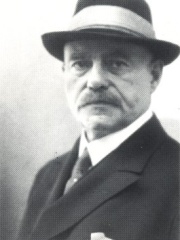
5. Hermann Sudermann (1857 - 1928)
With an HPI of 63.00, Hermann Sudermann is the 5th most famous Lithuanian Writer. His biography has been translated into 22 different languages.
Hermann Sudermann (30 September 1857 – 21 November 1928) was a German dramatist and novelist.

6. Branislaw Tarashkyevich (1892 - 1938)
With an HPI of 62.48, Branislaw Tarashkyevich is the 6th most famous Lithuanian Writer. His biography has been translated into 24 different languages.
Branislaw Adamavich Tarashkyevich (Belarusian: Браніслаў Адамавіч Тарашкевіч; 20 January 1892 – 29 November 1938) was a Belarusian public figure, politician, and linguist. He first standardized the modern Belarusian language in the early 20th century. The standard was later Russified by the Soviet authorities. However, the pre-Russified (classical) standard version was and still is actively used by intellectuals and the Belarusian diaspora and is informally referred to as Taraškievica. Tarashkyevich was a member of the underground Communist Party of Western Belorussia (KPZB) in Poland and was imprisoned for two years (1928–1930). Also, as a member of the Belarusian Deputy Club (Беларускі пасольскі клуб, Byelaruski pasol’ski klub), he was a deputy to the Polish Parliament (Sejm) in 1922–1927. Among others, he translated Pan Tadeusz into Belarusian, and in 1969 a Belarusian-language high school in Bielsk Podlaski was named after him. In 1933 he was set free due to a Polish-Soviet prisoner release in exchange for Frantsishak Alyakhnovich, a Belarusian journalist and playwright imprisoned in a Gulag, and lived in Soviet exile since then. He was shot at the Kommunarka shooting ground outside Moscow in 1938 during the Great Purge and was posthumously rehabilitated in 1957.

7. Vydūnas (1868 - 1953)
With an HPI of 61.27, Vydūnas is the 7th most famous Lithuanian Writer. His biography has been translated into 30 different languages.
Wilhelm Storost, artistic name Vilius Storostas-Vydūnas (22 March 1868 – 20 February 1953), mostly known as Vydūnas, was a Prussian-Lithuanian teacher, poet, humanist, philosopher and Lithuanian writer, a leader of the Prussian Lithuanian national movement in Lithuania Minor, and one of leaders of the theosophical movement in East Prussia.

8. Irena Veisaitė (1928 - 2020)
With an HPI of 59.91, Irena Veisaitė is the 8th most famous Lithuanian Writer. Her biography has been translated into 24 different languages.
Irena Veisaitė (9 January 1928 – 11 December 2020) was a Lithuanian theatre scholar, intellectual and human rights activist. She was awarded the Goethe Medal in 2012 for her contribution to cultural exchange between Germany and Lithuania.

9. Tomas Venclova (b. 1937)
With an HPI of 59.90, Tomas Venclova is the 9th most famous Lithuanian Writer. His biography has been translated into 19 different languages.
Tomas Venclova (born 11 September 1937) is a Lithuanian poet, prose writer, scholar, philologist and translator of literature. He is one of the five founding members of the Lithuanian Helsinki Group. In 1977, following his dissident activities, he was forced to emigrate and was deprived of his Soviet citizenship. Since 1980, he has taught Russian and Polish literature at Yale University. Considered a major figure in world literature, he has received many awards, including the Prize of Two Nations (received jointly with Czesław Miłosz), and The Person of Tolerance of the Year Award from the Sugihara Foundation, among other honors.
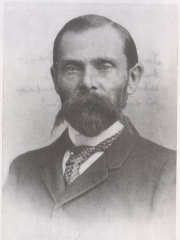
10. Francišak Bahuševič (1840 - 1900)
With an HPI of 59.31, Francišak Bahuševič is the 10th most famous Lithuanian Writer. His biography has been translated into 17 different languages.
Francišak Bahuševič (Belarusian: Францішак Багушэвіч; Polish: Franciszek Bohuszewicz; 21 March [O.S. 9 March] 1840 – 28 April [O.S. 15 April] 1900) was a Belarusian poet, writer and lawyer, considered to be one of the initiators of modern Belarusian literature.
People
Pantheon has 24 people classified as Lithuanian writers born between 1527 and 1961. Of these 24, 2 (8.33%) of them are still alive today. The most famous living Lithuanian writers include Tomas Venclova, and Arvydas Juozaitis. The most famous deceased Lithuanian writers include Czesław Miłosz, Romain Gary, and Simon Dach.
Living Lithuanian Writers
Go to all RankingsDeceased Lithuanian Writers
Go to all RankingsCzesław Miłosz
1911 - 2004
HPI: 75.74
Romain Gary
1914 - 1980
HPI: 72.97
Simon Dach
1605 - 1659
HPI: 63.77
Jonas Mekas
1922 - 2019
HPI: 63.50
Hermann Sudermann
1857 - 1928
HPI: 63.00
Branislaw Tarashkyevich
1892 - 1938
HPI: 62.48
Vydūnas
1868 - 1953
HPI: 61.27
Irena Veisaitė
1928 - 2020
HPI: 59.91
Francišak Bahuševič
1840 - 1900
HPI: 59.31
Justinas Marcinkevičius
1930 - 2011
HPI: 58.43
Žemaitė
1845 - 1921
HPI: 57.54
Jurgis Baltrušaitis
1873 - 1944
HPI: 57.08
Overlapping Lives
Which Writers were alive at the same time? This visualization shows the lifespans of the 20 most globally memorable Writers since 1700.

